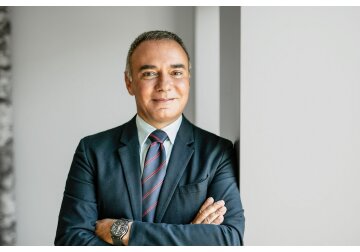
Philip Morris EU President: Investments in the economy are the best way to demonstrate commitment to a country
In 2023, Philip Morris International announced a $30 million investment in Ukraine and $3 million investment to relocate PMI's tobacco production to Chisinau. Following this announcement, the company launched a new production facility in the Lviv region, creating 250 new jobs, and started producing cigarettes at the Moldovan factory "Tutun-CTC".
President of Europe Region at Philip Morris International, Massimo Andolina, gave an exclusive interview to “InfoMarket” news agency and explained the reasons behind the company’s commitment to support Ukraine and Moldova.
The first question addresses the decision to invest in Ukraine and Moldova, considering the difficult geopolitical situation. Why is the company determined to support these countries?
Ukraine is still fighting an all-out war. While I’m sure that most companies might not consider a country going through such hardships for investments, we believe that now is the time to act for the economic recovery of the country and of the region.
Of course, investing in Ukraine and other countries in the area, such as Moldova, is not an easy business decision to make. Convincing a company’s shareholders of the reasons why you are proposing to invest capital and place your trust in the future of countries either at war or in a difficult geopolitical situation, is not an easy feat. And yet we did it, and I remain personally convinced that this is the strongest way for any company to show true commitment to Ukraine and neighboring countries like Moldova.
Philip Morris Moldova used to import tobacco products from Ukraine. Wouldn’t it be more convenient for the company just to find other supply markets rather than begin local production?
As you know, we suspended production in our Kharkiv factory in Ukraine as of the first day of the war in order to protect our people. We were then faced with the decision on where to manufacture our products for Moldova: while in an international company like ours multiple alternative sources existed, we became rapidly convinced that moving our production to Moldova, expanding our presence in the country was the right thing to do, also to demonstrate our commitment to remain a trustworthy partner for the national economy in the long run. We are confident that more companies will follow our example and be inspired by our steadfast resolve and commitment towards Ukraine and Moldova.
Still, the business environment in Moldova is unpredictable, considering that the country is not a member of EU. Does PMI see risks of investing in this market?
PMI isn’t new to Moldova and its business environment: we have been present in the country since 1996, we are a responsible employer and a valuable taxpayer to the state budget. We trust to have built a strong partnership in the country, and look ahead to a future together. In my view, this also means doing our part and providing even more support in difficult times, and this is what we are doing with this new investment.
Moldova has qualified specialists, local resources of various nature and offers interesting investment opportunities – all key components favoring the establishment of local manufacturing of high quality products. Launching cigarette production at the local factory will bring new standards of production, new technologies and know-how, and will ensure workplaces for years to come. It is also a tangible way to bring Moldova closer to Europe, enhancing collaboration and business exchanges among our European affiliates and our Moldova partners.
What are the company’s expectations from the local authorities when it decides to invest in a market?
Every company deciding to operate – or invest – in a certain country expects a stable and predictable operating environment, pragmatism and a pro-business orientation of the regulatory framework present and future, all elements which allow businesses and the economy to thrive. In the specific case of countries like Moldova, that have also expressed an ambition to join the European Union, when we look at our business we find it of paramount importance that science-based regulations today prevailing in many EU Member States may serve of inspiration to craft policies aimed at curbing the smoking incidence in the country.
Talking about taxation and regulation, Moldova has the ambition to become an EU member. What are the areas in which our country is lagging far behind the rest of the EU states?
When I look at the tobacco industry in the European Union, both taxation and product regulations constitute two major legislative components of the tobacco control framework. They both have different provisions regarding cigarettes and smokeless products. In setting legislative frameworks, Moldova has today an opportunity to benefit from the European experience, where the large majority of countries have embraced smoke-free alternatives (such as e-cigarettes, nicotine pouches, and heated tobacco products) as a powerful tool to reduce smoking incidence, and have recognized their difference from cigarettes both in regulations and differentiated taxation.
According to the analyses, in the EU, the difference between the excise duty applied to smokeless products and cigarettes is on average over 60%. This is a level of differentiation that enables adult smokers to clearly understand that not all products are the same and that the state recognizes that distinct risk profiles should equate to distinct tax levels.
It is important that the Republic of Moldova creates an appropriate legislative framework for innovative smokeless products to send a clear message to its citizens that they are fundamentally different than cigarettes. That’s the only way to encourage better behaviors and get people away from cigarettes as soon as possible in order to positively impact their lives, public health, and society at large.
Today, we estimate that in Moldova more than 25% of women and men smoke. They deserve access to correct and scientifically validated information about the better alternatives out there. We remain convinced that when people are properly informed, they can make better choices: that’s why we always advocate for laws and regulations based on scientific evidence.
How can governments stimulate investments and innovation through fiscal policy? What can the Moldovan authorities do to accelerate the smoke-free future?
I believe it is key to have a modern and evidence-based approach toward regulation and taxation. Data shows that countries endorsing harm reduction at different levels are seeing a faster decline in their smoking rates. Such an approach is undeniably in the interest of public health and society at large.
Our industry ranks second in terms of government revenues from excise taxes paid into the Moldova’s state budget. Yet an opportunity still exists for the Moldovan Government to embrace a more pragmatic approach towards both regulation and taxation of smoking and smokeless products in differentiated ways, as several other EU governments already have.
That said, I’m confident that through a transparent dialogue with all industry stakeholders, things can swiftly move in the right direction in Moldova as well, and that cooperation with the Tutun-CTC company is the beginning of a long-term partnership that will have many stages of development.
What is the PMI strategy toward achieving a world without cigarettes?
Since announcing our commitment to a smoke-free future, we have made significant progress toward replacing cigarettes with better alternatives for those adults who would otherwise continue to smoke. To date, we have invested more than $12.5 billion in the development, manufacturing, and marketing of our smoke-free products, which are now available in 84 markets around the world. At the end of 2023, more than 20 million adults globally had switched to our leading heated tobacco product and stopped smoking. Furthermore, this change has allowed us to expand our social, human, manufacturing, and intellectual capital in ways that enable us to make huge leaps forward.
But all this is not enough if innovation and science regarding smoke-free products are not appreciated at their right value—not only by consumers, but by all those who have a role to play. It is a change that must be facilitated and accelerated: We need governments, regulatory agencies, and everyone who can support this journey to join forces to deliver a world without cigarettes, as fast as possible.







